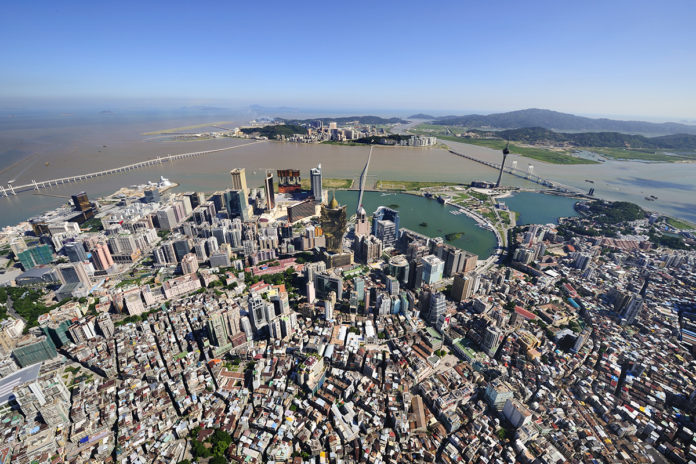The central government wants to increase Macau’s role in business exchanges and cooperation between the mainland and Portuguese-speaking countries. A series of recently announced measures includes the creation of a training centre in Macau for Portuguese speakers from overseas. Macau will also contribute an undisclosed amount to a new US$1 billion (MOP8 billion) financial cooperation fund, announced last month. “Macau is becoming an important platform for economic cooperation and trade between China and the Portuguese-speaking countries,” Chinese Premier Wen Jiabao said during his Macau visit in mid-November. “It has sound infrastructure, a sophisticated financial services system, a free and open business environment and a reservoir of Chinese-Portuguese bilingual professionals.” Mr Wen took part in the third ministerial conference of the Forum for Economic and Trade Cooperation between China and the Portuguese-Speaking Countries. It was his first visit to Macau and his first appearance at a forum meeting (For more on his visit, see story in the Politics section). He was the star draw among the more than 1,500 senior officials and business leaders from the mainland, Angola, Brazil, Cape Verde, Guinea-Bissau, Mozambique, Portugal and East Timor at the forum. São Tomé and Principe was the only Portuguese-speaking country absent. It is not a member of the forum because it maintains diplomatic relations with Taiwan. Human resourcesMr Wen told delegates that since the forum’s creation in 2003 “economic and trade ties between Macau and the Portuguese-speaking countries have also been strengthened”. The premier said “companies from Macau are now active in all the Portuguese-speaking countries”, while these countries are making more and more direct investments in Macau. He said companies in the Portuguese-speaking world had already set up factories in Macau to process coffee imports from Brazil and East Timor that was exported to mainland China, “reaping handsome returns”. At the ministerial meeting the premier announced the creation of a centre in Macau to train up to 1,500 officials and technical personnel from developing Portuguese-speaking countries in Africa and Asia. The Secretary for Economy and Finance Francis Tam Pak Yuen said the University of Macau would house the centre. He said the centre would also enhance human resources cooperation between China and Portuguese-speaking countries, boosting exchange. Mr Tam dismissed concerns the centre would fail to meet its objective because the city was already stretched for talent. There were no further details on the centre’s curriculum or opening date. There was also a commitment from China and the Portuguese-speaking countries about using Macau as an arbitration centre for commercial disputes between firms from both sides. Cash injectionMr Tam challenged small and medium-size enterprises (SMEs) to make the best use of the US$1-billion cooperation fund. “The great goal of the fund is to deepen the relations between China and the Portuguese-speaking countries. We hope that local SMEs can give a hand to improve the role of Macau as a platform,” he said. Newspaper reports that the government has already earmarked a US$50-million contribution were not officially confirmed. The Economic Services Bureau and the Macau Trade and Investment Promotion Institute are assessing the contribution to the fund. “We did say that we can afford to inject US$50 million, but how much we will eventually put into the fund depends on the views from the Portuguese-speaking countries,” Mr Tam said. Ambitious goalsThe ministerial conference set some ambitious goals for developing trade ties. It was agreed to raise the value of trade between the mainland and Portuguese-speaking countries to US$100 billion by 2013. In the first three quarters of this year, trade was worth US$68.2 billion, up 57 percent from this time last year. Beijing announced it would make RMB1.6 billion (MOP1.9 billion) in concessional loans to developing Portuguese-speaking countries in Africa and Asia. Also announced were full funding and support for an agricultural cooperation project in each of these countries, while providing each with medical equipment worth RMB10 million. A total of 1,000 one-year government scholarships to study in China where also offered. East Timor’s President José Ramos Horta described the forum as a flexible mechanism for cooperation that had brought immense benefits to the peoples of the countries involved. The prime minister of Portugal, José Sócrates, said the forum offered a unique opportunity for China and Portuguese-speaking countries to promote bilateral trade and investment. The forum’s fourth ministerial conference is scheduled to take place in Macau in 2013. Macau and Cape Verde ink tax agreementMacau and Cape Verde last month signed an agreement to avoid double taxation and prevent tax evasion. In Macau, the agreement will cover professional tax, complementary income tax, and investments, making life easier for companies operating in both markets. This is the fifth tax agreement signed by Macau, after having inked similar deals with mainland China, Portugal, Belgium and Mozambique. The government is currently negotiating similar agreements with other Portuguese-speaking countries and Asian jurisdictions.
—
























